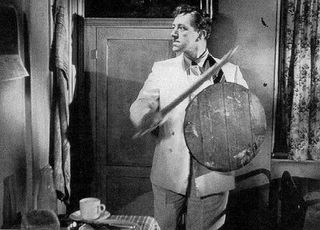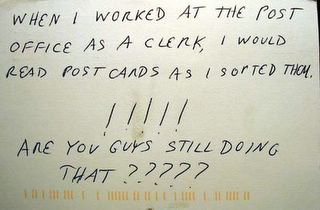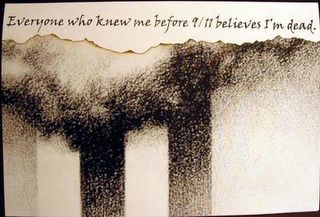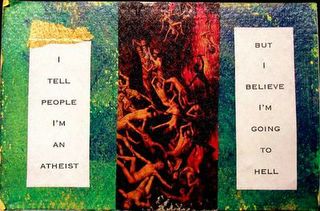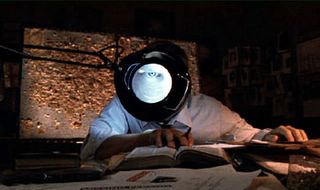Naked Lunch
A writer lives the sad truth like anybody else; he just files a report on it.
That's about the whole film Naked Lunch summarized right there. People always comment about how strange and surreal the film is, with its combination of William Burroughs headtrip of a novel and David Cronenberg's musings on the details of Burroughs own life. But it's not as if the movie's genuinely difficult to follow. It's just strange and illogical.
But then, the act of writing itself is strange and illogical. So a movie about a man realizing that he is a writer, and what that means for his psyche and his place in the world, should then follow suit.
If there is anything difficult about Naked Lunch, it's trying to meld all of its ideas together into one coherent theme. This is a movie with so much depth, that's so excited with innovation, discovery and the giddy thrill of getting away with soemthing, it's hard to coalesce everything into just one concept (or, let's say, blog post). But I will do my best.
Any straightforward adaptation of Burrough's novel "Naked Lunch" would be impossible. The book has no real story. It's more a collection of smaller, amorphous stories, what Burroughs himself would call "routines." These routines would start with a simple idea, like say a man learning how to speak from his asshole by controlling his farts, and would then build to a shocking or unexpected climax, like the asshole sealing up the man's mouth and taking control of his body.
So you couldn't really make that into a movie. Well, I suppose you could, but I probably wouldn't want to watch it. Instead, Cronenberg made a movie about the writing of the novel "Naked Lunch," and how Burroughs life experiences became intertwined with the crazed fiction he composed during a self-imposed exile in Tangiers.
See, Burroughs had accidentally killed his wife in a bizarre drunken accident, and then he fled the country in horror and shame. He set up shop in Tangiers, did a lot of heroin and wrote letters to his New York friend, the poet Allan Ginsberg. These letters, and the writings that accompanied them in the envelopes, along with other writings of Burroughs from this period, eventually became the novel "Naked Lunch." Cronenberg's film attempts to get inside the author's head, to explore what visions he might have seen while he was composing the book, and how the recent tragedy of his wife's death might have invaded his unconscious mind.
So that's a heady beginning for any story. But it is only the beginning, the outline. The film goes on to consider a variety of themes, from the nature of objective reality, the influence of technology on human creativity and ingenuity, existential paranoia and fear of conspiracy, and homosexual panic. And more, more, many more.
It all goes back to that quote I put at the top - a writer feels the pain that all human beings feel, and for Burroughs, the pain included guilt over his violent past, his drug abuse and his sexual attraction to men. So, in the reality of the film, he experiences these horrible thoughts and feels panic, and then records his feelings in the form of "reports" sent to an underground conspiracy run by cockroaches.
Yeah, cockroaches. Cronenberg's film overflows with icky, unsettling imagery involving bugs. There are overgrown bugs that suck the life fluids from human beings, typewriters that transform into talking cockroaches and centipedes that are ground up into paste and injected as a drug.
It's all intended as an elaborate visual metaphor, presented in the film in the form of hallucinations experienced by the protagonist, ex-exterminator Bill Lee (Peter Weller). Lee loses his job after he and his wife (Judy Davis) become addicted to powder he uses to kill bugs. After he murders his wife accidentally in an attempt to shoot a glass off her head (in a scene based on the actual death of Joan Burroughs), Lee leaves for Interzone, a North African province under the control of a voodoo preistess (Monique Mercure), a suspicious drug dealer/doctor (Roy Scheider) and the aforementioned cockroach conspirators.
I was reminded for a time of the film Swimming Pool. That's another movie that presents the creative process a novelist undergoes while writing to a kind of alternative reality. We the audience experience the writer's composition as reality, and are unable to separate the finished work they have written from the time they spent actually writing.
But whereas Swimming Pool used this technique to examine the internal sexual life of an aging woman, Cronenberg uses it to explode the themes permeating Burrough's writing, to try and fuse his own slanted world view to Burrough's. Lee's adventures, which include travels amongst the young male hustlers of Interzone, various conversations with a variety of aliens and insects, and an affair with the wife of another writing living in Interzone (Ian Holm), don't add up to any kind of sensible storyline, but they do give an impression of the fevered, half-remembered, hazy process Burroughs underwent as a half-sane junkie composing a novel in fragments he then mailed back to America.
Naked Lunch manages to sustain itself in story form mainly due to the performances of Peter Weller as Lee and Judy Davis, in a dual role as Lee's wife and the woman he falls in love with in Interzone. Neither of the Davis characters appeared in Burroughs original book, but Cronenberg wisely added them. One could argue that he needed a female presence in the work to balance out the overheated homosexual content of Burroughs novel. But he also needed some sort of framework on which to hold to surrealism, from a purely cinematic viewpoint.
Film audiences seem willing to accept surrealism, or at the very least non-linear or illogical story progression. But only to a certain extent, where it can still be explained by some internal logic within the movie. For example, people will go see Eternal Sunshine of the Spotless Mind, a very strange movie that makes sense only from a certain standpoint. But they accept it because Kaufman's script attempts to explain itself through a science-fiction premise - the leaps in time and conveniences of memory occur because there is a device that can erase relationships from your mind. Done and done.
Likewise, think of Donnie Darko. This has become a cult hit on DVD, and it includes many strange flights of fancy, but it is held together by an 80's teen comedy formula. Actually, Darko may not be the best example, because its director Richard Kelly insisted on re-editing the film into a Director's Cut that makes it more straight-ahead science-fiction. The odd ambuguity of the original film was then lost.
But anyway, Naked Lunch hangs its metaphysical exploration into the heart of fear and desperation on a familiar narrative arc. A writer, following a personal tragedy, accepts a strange job in a strange land, where he must follow up a mystery larger than he could have possibly imagined. That could describe a million movies, and it doesn't adequately describe Naked Lunch, but you see my point. Without the nods to what we expect from cinema - romance, intrigue, linear storytelling - would it be possible to maintain audience interest for 2 hours?
Finally, I must speak about the visual effects in the film, which are quite brilliant. The gruesome side of Burroughs imagination mixed wtih the keen eye for gore Cronenberg developed over years of directing horror makes Naked Lunch a delightfully visceral creepshow. The buggy typewriters, which gyrate sexually when someone types on them, are the usual rubbery Cronenberg prototypes. But he's never really been called upon to create full-formed monsters on the level of the aliens in the film, before or since. That's one of them in the photo with Mr. Weller above.
A lot of the effects work reminded me of another great and underseen Cronenberg film, Existenz. In fact, now that I think about it, the fictional video-game world of that film kind of resembles a trippy Burroughs nightmare. All the squishy, bio-waste creatures and animals in both films add a level of unspoken menace. There's just something unsettling about a typewriter that breathes, I can't put my finger on it.

